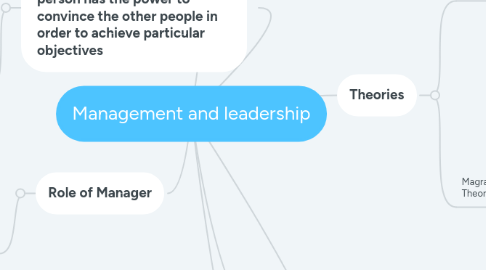
1. Role of Manager
1.1. 1-motivate 2- represent 3- allocate resources 4-delegate 5-plan 6-set objectives 7-control 8- monitor 9-cordinate
2. Leadership Is a skill or an art due to which a person has the power to convince the other people in order to achieve particular objectives
2.1. Characteristics 1-truthfulness 2- honest 3-charismatic personality 4-convincing power 5-visionary 6- good knowledge 7-can think out of the box 8-confident 9-loyal 10-ability to delegate 11-willingness 12-good communicator
3. Emotional intelligence Is the ability of the manager to understand the people emotions and think with emotions as well
3.1. Needed skills
3.1.1. Self awareness Is to know about own ability and have confidence on it
3.1.2. Self management Is to be able to manage the emotions and have self control
3.1.3. Social skills Have the ability to communicate with others and build social relationship
3.1.4. Social awareness Is to be aware of own opinions as well as other people opinions as well.
3.2. Benefits Relationship with employees Communicate Motivate Encourage interpenur Flexiblity
4. Manager: is a important person of the organisation who is expected to take important decisions and motivate the staff
5. Theories
5.1. Mintzberg Role of manager
5.1.1. Interpersonal role
5.1.1.1. 1-Motivate 2-influence 3-laison participation 4-figurehead
5.1.2. Informative
5.1.2.1. 1-Spokesperson 2-gather information 3-discrimnate information 4- provide information
5.1.3. Decisional
5.1.3.1. 1-resource allocation 2-set objectives 3-whom to delegate
5.2. Magrader Theory X and Y
5.2.1. Theory X is a type of manager who follows and believes that the employees are capable enough to take the responsibility and is creative
5.2.1.1. Autocratic leadership style
5.2.1.1.1. Analysis It demotivates the staff And lesser chances of communication Between employees and manager There is less chances of mistakes and it is less time consuming
5.2.2. Theory Y is another type in which the manager thinks that the employees are nit capable enough to take the responsibility, is not really active and even not creative
5.2.2.1. Democratic and even laissez faire
5.2.2.1.1. Analysis It motivates the staff There is a chance for communication with the employees Satisfaction Sense of trust and belongingness More chances of mistakes Chances of loss Maybe the majority is not always right
6. Leadership style
6.1. Autocratic
6.1.1. Analysis Demotivating Miss better ideas Saves time Better decisions
6.2. Democratic
6.2.1. Analysis Motivates Better ideas by youth Chance to communicate Time consuming Ineffective decisions
6.3. Peternalistic
6.3.1. Analysis Time consuming Communication Dissatisfaction Demotivating
6.4. Laisez-faire
6.4.1. Analysis Motivating Sense of belongingness Bad decisions Conflict between employees
